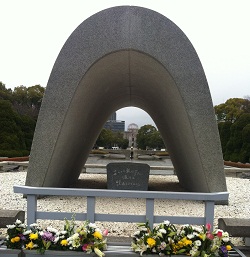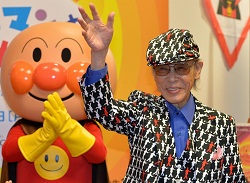Like the tundra in the cold reaches of the Arctic, there is life beneath the wasteland. Japan is a well watered land, but spiritually a desert. But we believe amidst the wilderness is a well, the spring of life, the seeds of faith in Yaso (Jesus), first sown in the 16th Century, waiting to spring forth.
Prime Time TV Drama On Christianity
In 2013, a series of Christian story was broadcast every Sunday, at the popular 8pm prime time. It was about a lady who became a wife of Niijima, founder of the first Christian university in Japan. Niijima was the first Japanese to graduate from a US university and he returned to Japan to start the Doshisha University with the motto “Truth shall make you free”.
In this program, the Christian song, “Jesus loves me, this I know”, often sung in Sunday schools, was sung by the Japanese ladies who were studying under the care of this couple. In one episode, as a way of practicing English by singing this English song, they repeated the song again and again. Bible verses were also quoted through the students and teachers. The program as a whole also portrayed the Christian ways of marriage, handling persecutions and oppression, and overcoming difficulties.
Drama On Japan Christianity
In 2014 another Christian program was aired at the same popular prime time. The drama was about Kanbei Kuroda, a famous strategist under Hideyoshi Toyotomi who unified Japan in the 16th century. Kanbei later became a lord of Fukuoka. The program is aired by NHK, a government broadcasting station.

One episode depicted a scene where Kanbei decided to become a Catholic (in those days, no Protestants in Japan). He was given a Christian name, Simeon. It was indeed thrilling to hear the lines of a Christian lord who influenced Kanbei for Christianity, saying “You can find peace in God in the midst of devastation of wars” and “The door to God is always open, for anybody.”
Japan Christian Sharing During World War
There was another TV drama on Christian sharing by a family after the devastation of second world war. The drama was broadcast in 69th commemoration of the end of the Second World War. The Japanese were starving to death after the was and the mother of this family said “As a Christian, we must share what we have”. She went out to sacrifice what little food they had to share with their neighbors.

And the last but not in the least, an 8 am morning prime time on NHK was a story of a lady writer who went to a Christian school and became a Christian. She wrote children’s stories which had a theme of God’s love, though not saying the word “God”.
To Share The Living Bread
Isn’t this a sign that Japan is now more open to Christianity? Hard ground Japan has been, but we know Christ is bringing about a stirring, in a society that has been shaken, both seismic wise as well as one drained economically and emotionally these past two decades.
Another story teller, Takashi Yanase, who created a very popular animation series called Anpan Man, left a deep impression on the Japanese people. He passed away in the year 2013, but his works are still very popular. Many children grew up with this story. He was a Christian and was once interviewed saying that he wanted to create a hero, not just for his power to knock down his enemies, but for his gentleness and love to care for the weak. Anpan in Japanese means a sweet bean bread, well liked by the Japanese. The Anpan man, having the face of anpan bread, gives a part of his face to the hungry crying children. Isn’t this something like our hero Jesus?
Japan Awakening
We strongly sense that Japan is now more open to Christianity. In Christianity, they see something different, something noble and something they need in Japan.
May we His people shine brighter all the more now in Japan!
